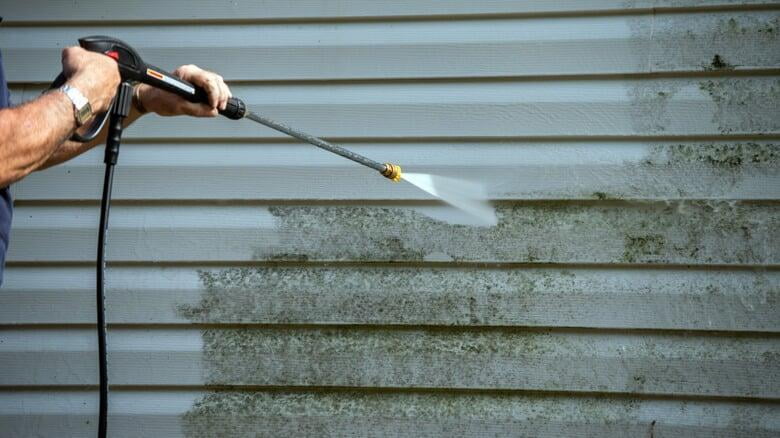Power washing is the process of using a high-pressure water spray to clean surfaces and objects like buildings, fences, masonry, some cars, and concrete or asphalt surfaces like driveways or patios of loose paint, mold, algae, grime, dust, muck, and chewing gum. The terms "power washing" and "pressure washing" are frequently used interchangeably, however they refer to two distinct techniques. Both use high-pressure water to clean surfaces; however, power washing incorporates a heating element whereas pressure washing does not.
As with any cleaning technique, hot water is more effective. Some items, such as baking soda, vinegar, citric acid, or commercial power washing soaps, detergents, sanitizers, or disinfectants, should be power or pressure washed with added chemicals. Here are seven more things to consider before power or pressure washing anything in your home:

Understand when to power wash versus pressure wash
The concept of having your house, deck, driveway, or other domestic elements steam cleaned is tempting. Hot water sprayed through a high-pressure hose will remove even the most persistent grime and stains. However, it is not the ideal choice for things like brick, concrete, or masonry. All of that cleaning power comes at a cost. Power washing can be quite damaging to those surfaces. Instead, use a pressure washer and a suitable cleaning.
Understand the distinctions between household and professional detergents, soaps, chemicals, and cleaning solutions
Not all cleaning solutions are created equal. Knowing the differences between cleaners can make the difference between cleaning and ruining what your Power washing. Power washers employ four different types of chemicals. These chemicals are labeled according to their intended usage and the type of surface on which they will be utilized. Cleaners remove filth, sanitizers destroy most germs (99.999% in 30 seconds or fewer), and disinfectants kill all organisms in 30 minutes or less.
Consider the size of the cleaning area as well as the surface type
Because the primary or only difference between the two procedures is heat, it is critical to consider the size of the area to be cleaned as well as the type of surface to be cleaned. When compared to unheated water, the main advantage of using hot water is that it provides a far more efficient and effective thorough clean. For larger areas, heated water is a preferable cleaning option. A power washer is also a preferable alternative if the area you'll be cleaning has a lot of salt, mildew, moss, or weeds.
Discover the distinction between commercial and residential power washers
If you're a die-hard do-it-yourselfer, consider renting a commercial power washing machine instead of purchasing or using a home unit to clean huge areas. Even better, hire an expert. Whether the unit is a residential or business unit, an untrained homeowner might either damage the object being cleaned or leave visible cleaning lines that detract from the item's beauty. You can risk damaging the power washer or injuring someone. Hire Power Washing Upper Marlboro Md.
Take into account the season
The majority of Power washing is done in the autumn or spring. Check the weather forecast if you get a few warm days in the winter. Shooting water into cracks and crevices is good in warm or cool weather, but if freezing weather is expected within a few days to a week following pressure/washing, be careful that water may freeze and expand, causing damage to what you've cleaned. Before you wash, be sure the temperature does not go below freezing. Do Check this Power Washing Upper Marlboro Md, which is best for you!
